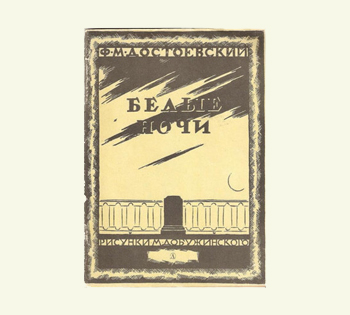
.
.
.
.
It
was a marvellous night, the sort of night one only experiences when one
is young. The sky was so bright, and there were so many stars that, gazing
upward, one couldn't help wondering how so many whimsical, wicked people
could live under such a sky. This too is a question that would only occur
only to the young, to the very young; but may God make you wonder
like that as often as possible!
.
.
.
.
. . I'm acquainted with houses too. As I
walk up a street, each house seems to have darted ahead and to be waiting
for me, looking at me out of all its windows, almost saying: "Hello!
How are you getting on? I'm fine myself. And you know what? They're going
to add another story to me in May!" Or: "How are you? Well,
me, I'll have to undergo some repairs tomorrow." Or: "You know,
I almost burned down last night. It gave me such a fright!" And other
things of that sort. Among houses, I have my favourites. Some are intimate
friends. One had decided to undergo a course of treatment with an architect
during the summer. I'll make a point of visiting him every day, in case
the treatment turns out to be fatal, God forbid! I'll never forget what
happened to one very pretty, rosy little house. Although he was rather
haughtily distant with his clumsy neighbours, that little stone house
used to look at me so nicely that I always felt glad as I passed by. But
last week, as I was walking along that street, my friend looked at me
dejectedly, and I heard his plaintive cry: "They're painting me yellow!"
Ah, the criminals! The barbarians! They spared nothing; neither the columns
nor the cornices, and my friend became yellow as a canary. I nearly had
an attack of jaundice myself, and I still haven't been able to go back
and visit my poor disfigured friend painted in the colour of the Celestial
Empire.
.
. As I said, I'd been uneasy for three days and now I'd discovered
why. Things didn't feel right in the street—this one was missing, that
one was missing, and where on earth was such-and-such? And at home, too,
I wasn't quite myself. For two whole evenings I'd tried to determine what
I was missing in my corner, why I was so ill at ease there. Puzzled, I
kept examining my green walls with their black soot stains, the ceiling
covered with cobwebs that Matryona cultivates with such eminent success.
I examined every piece of furniture, every single chair, to see whether
the trouble wasn't hidden just there. For I know that I can be badly upset
if a chair is not in exactly the same place as it was the day before.
I also looked at the window. But all in vain. I even decided to call in
Matryona and give her a fatherly scolding about the cobwebs and about
her slovenliness in general. But she only looked at me, surprised, and
left without answering a word; the cobwebs remained unmolested.
.
.
.
.
.
.


